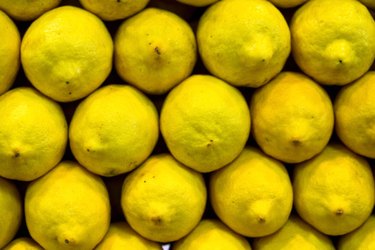
When you want to clean glass, you want results without streaks or smudges. You also may want a green approach that leaves you feeling like you weren't cleaning glass at the expense of the environment. Many glass cleaners contain ammonia. Ammonia produces harsh fumes. When mixed with bleach, ammonia produces many toxic gases some of which can prove fatal in large doses. Make your own eco-friendly, ammonia-free glass cleaners and rest easy that your glass cleaning isn't dangerous.
Vinegar
Video of the Day
Vinegar is the acidic byproduct made from the fermentation of fruits or grains. The United States Food and Drug Administration requires all vinegars to contain a minimum 4 percent acidity level. This acidity makes for an excellent cleaner. To make a homemade glass cleaner, combine 1/2 cup white vinegar and 1/2 gallon water. You can pour the solution into a spray bottle. Spray bottles are available at discount, grocery and dollar stores. Do not use vinegar glass cleaners on stone floors, such as marble tile, as the acid erodes stone surfaces.
Video of the Day
Rubbing Alcohol
You can use Isopropyl alcohol, otherwise known as rubbing alcohol, undiluted to clean glass for a streak-free finish. Rubbing alcohol evaporates quickly and is an effective cleaner for glass, chrome and stainless steel. You can combine rubbing alcohol with equal parts water to decrease the rate of evaporation while cleaning large plates of glass such as windows. Rubbing alcohol is toxic when ingested, so keep it away from children and pets.
Corn Starch
Corn starch is a kitchen staple that has absorbing properties and is a mild abrasive. You can make a homemade glass cleaner without any ammonia content, by mixing 1 quart hot water with 1/4 cup corn starch. Wet a cleaning cloth or sponge in the solution and wash the glass. You can use a paper towel or dry cleaning cloth to dry the glass, polishing it to a shine. Corn starch is natural and safe and poses no threat to children or animals.
Lemon Juice
The fresh scent of lemons is used in many store-bought cleansers from bathroom cleaners to dishwasher detergent. Lemon is naturally acidic, and these properties effectively cut through grease, grime, dust and dirt accumulation found on some glass such as outdoor windows. Pour lemon juice undiluted into a clean spray bottle. You can use a dry cleaning cloth to dry the window to a polished shine. You can also dilute 2 tbsp. lemon juice with 1 qt. hot water and pour into a spray bottle for tough, built-up grime.
- The Vinegar Institute: Frequently Asked Questions
- Mrs. Clean's House Cleaning & Maid Service; Make Your Own Glass & Window Cleaner; 2011
- Yamato Green; Clean Aquarium Glass Safely; 2006
- Dotti’s Place: For All Your “Glass” Cleaning
- Oregon Metro; Green Cleaners; August 2008
- U.S. Food and Drug Administration; Draft Guidance for Industry: Acidified Foods; January 2011
- British Broadcasting Company: The Dangers of Mixing Bleach and Ammonia
- “Consumer Reports”; Homemade Cleaning Products; January 2009